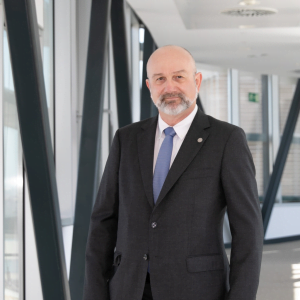
European Intellectual Property Office (EUIPO)
Director EUIPO
Paul Maier
Trade in counterfeit goods is a growing problem that poses significant risks to the health and safety of consumers.
Increasingly sophisticated counterfeiters manufacture products that are ever more difficult to distinguish from genuine ones, and target a wide range of areas, including pharmaceuticals, food and drink, automotive and aerospace parts, and electrical equipment. These counterfeit products are often of poor quality, do not meet safety or environmental standards, and they can cause serious harm to consumers and damage to the environment. Some of the most frequent risks from dangerous fakes include biological, chemical, physical injuries, strangulation, choking, burns, electric shock, fire or damage to hearing. As an example, small parts from toys, magnetic components and especially batteries, can be swallowed and cause significant intestinal damage to children. In addition, many dangerous products pose several risks at the same time. For example, a fake car battery can cause serious health, safety and environmental damage.
As consumers have been embracing the digital age and e-commerce, counterfeiting and piracy online have equally become increasingly prevalent. E-commerce plays a key role in the movement of counterfeit goods or dangerous products, destined for the EU. A recent study by the European Union Intellectual Property Office (EUIPO) and the OECD showed that online sales represented 60 % of global seizures. Of these, cosmetics were the most frequently seized products (46 %), followed by clothing (18 %), toys and games (17 %) and automotive spare parts (8 %). Most of these dangerous fakes came from China (55 % of global customs seizures) and Hong Kong (19 %), accounting for almost three quarters of seizures. Turkey accounted for 9 % of dangerous goods.
Another element to be considered is the economic impact of counterfeiting, including job losses. In a series studies estimating lost sales in 11 sectors in the EU as a result of counterfeiting, it has been measured that, during the period 2013-2017, 83 billion euros and 671 000 jobs (i.e. about 6.9 % of jobs in the sectors) were lost annually due to counterfeiting. To give an indication of the seriousness and extent of the problem, 6.8% of EU imports – worth EUR 121 billion – are counterfeits. Only in the pharmaceutical sector, EUR 4 billion worth of counterfeit products are traded worldwide.
Tackling the threat posed by counterfeiting and piracy is not just a matter of law enforcement. It will also require greater awareness by consumers. Young people’s choices and respect for IP rights offer a strong indication of future consumer behavior. A recent EUIPO study, The IP and Youth Scoreboard paints a worrying picture in this regard. More than half (52 %) of Europeans surveyed aged between 15 and 24 said they had bought at least one fake product online over the past year, both intentionally or by accident, and a third (33 %) said they had accessed digital content from illegal sources. Looking at those who did it on purpose, 37 % bought a fake product and 21 % used, played, downloaded, or streamed content from illegal sources. In Romania, 40 % of young people bought a fake intentionally and 14 % knowingly accessed pirated content.
The European Observatory on Infringements of IP Rights is a network bringing together all the relevant players, experts and stakeholders to better understand and promote the value of IP and support the fight against IP infringements. Alongside law enforcement authorities and the private sector, civil society organisations have a key role to play to ensure that citizens are protected.
The ongoing cooperation of consumer organisations is essential to help empower consumers with the knowledge and tools to identify and to avoid counterfeit products. InfoCons is a very valuable civil society stakeholder of the Observatory. We would like to commend your association for your commitment to raising awareness of the importance of intellectual property to consumer protection, and for your work to support informed and active consumers and changes of mindsets regarding counterfeit products.
Close cooperation between all players involved is crucial to help protect consumers from unsafe and unreliable counterfeit products, which may threaten not only European jobs and growth and the environment, but also citizens’ individual health and safety.
